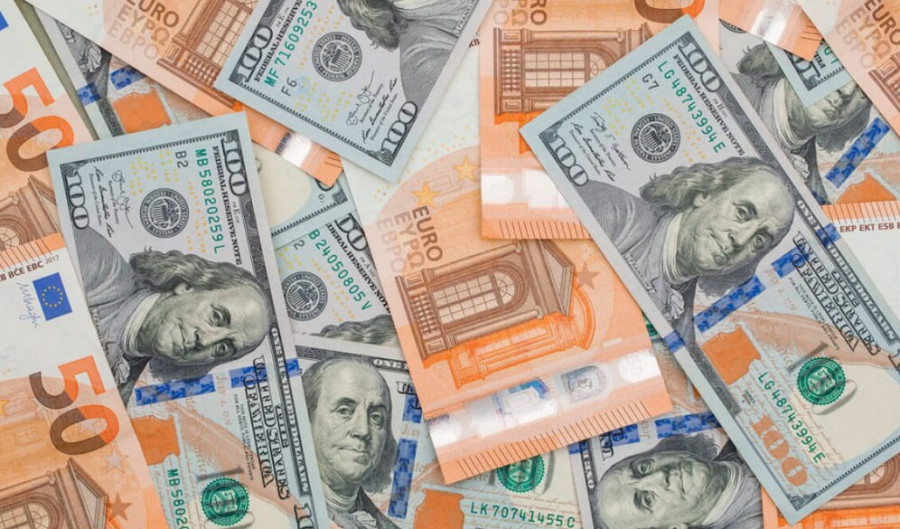A new day brings new price records. Today, the EUR/USD pair reached 1.1051, marking its highest level since December 24, 2022, when the pair tested the 1.11 level. After eight months, traders are once again eyeing the 1.11 price level. The overall weakness of the U.S. dollar is allowing EUR/USD buyers to anticipate further gains, especially as the euro has been "gaining strength" recently due to discussions about the potential divergence in the policies of the Federal Reserve and the European Central Bank (ECB).

The U.S. Dollar Index dropped sharply today, testing the 101 level for the first time since January this year. This sharp decline may seem unusual at first glance, as Monday's economic calendar is nearly empty. The only notable event is the speech by Federal Reserve Board member Christopher Waller, who will express his views during the U.S. trading session. Additionally, the Leading Indicators Index will be released today (this index includes ten components, ranging from consumer expectations to building permits). However, this secondary release typically does not have a significant impact on the market.
In other words, it may seem that the EUR/USD pair is rising "out of nowhere." But that's not entirely accurate. The dollar has reacted quite strongly to recent statements by Federal Reserve officials, whose rhetoric has been dovish. For example, San Francisco Fed President Mary Daly, who has voting rights on the Committee this year, stated that it's "time for the Fed to adjust its policy." According to her, recent macroeconomic data suggest that inflation is moving toward the 2% target, and delaying a rate cut could lead to "undesirable outcomes," namely price stability with an unstable labor market. Daly did not specify the optimal (in her view) size of the rate cut for the September meeting. In this context, she offered a rather vague statement that the Fed needs to adjust the base rate "in line with the economic situation and considering the central bank's goals."
Another Fed official, Chicago Fed President Austan Goolsbee, also cautioned his colleagues against maintaining restrictive policy "longer than necessary." According to him, keeping the interest rate at its current level while inflation is declining "is a form of tightening monetary policy." He emphasized that not cutting the rate at the September meeting could harm the labor market.
Goolsbee's colleague, Minneapolis Fed President Neel Kashkari, echoed these concerns in an interview with The Wall Street Journal, urging his colleagues to cut the interest rate in September. He noted that inflation is progressing while the labor market shows "rather alarming signs."
In other words, three Fed officials simultaneously conveyed the same message: delaying the easing of monetary policy is "tantamount to disaster."
As we can see, the July Nonfarm Payrolls softened the Fed's rhetoric, with central bank members increasingly expressing concerns about the labor market situation. It's worth noting that after the July meeting, the Fed revised one of the key phrases in its accompanying statement. In July, the central bank indicated that it was "attentive to risks to both sides of the mandate"—i.e., price stability and maximum employment. Previously, the regulator only mentioned a high focus on inflation risks.
Given that these remarks were made by Fed members just days before the economic symposium in Jackson Hole, they triggered increased volatility. Market participants began speculating that Jerome Powell might also adopt a more dovish stance on Friday, increasing the likelihood of a 50-basis-point rate cut in September.
It's worth noting that this will be Powell's first public appearance following the release of July's CPI and PPI growth data, the disappointing July Nonfarm Payrolls, and "Black Monday." Ahead of Powell's Friday speech and following the dovish rhetoric from Daly, Goolsbee, and Kashkari, the dollar is under additional pressure, especially against the euro, which is strengthening on speculation that the ECB may maintain the status quo in September. Ultimately, everything will depend on the August inflation report for the Eurozone, which will be released in early September. In July, the overall CPI accelerated, while the core CPI remained at the previous month's level. If European inflation shows stubbornness again in August, the ECB may refrain from easing monetary policy at the September meeting. Such speculations provide background support for the euro.
Overall, the fundamental backdrop supports further growth in EUR/USD.
From a technical standpoint, the pair on the daily chart is positioned between the middle and upper lines of the Bollinger Bands, and above all the lines of the Ichimoku indicator, which has formed a bullish "Parade of Lines" signal. The target for the upward movement remains at the 1.1110 level, which corresponds to the upper line of the Bollinger Bands indicator on the MN timeframe.





















